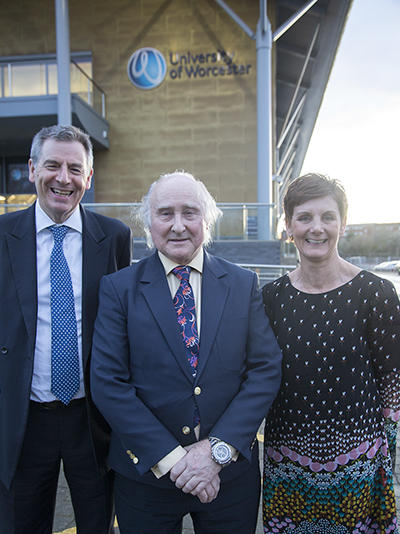A national expert in health and social care, involved in advising the Government on integrating the two services, believes the University of Worcester will play a key role locally in that process.

Professor David Croisdale-Appleby OBE was at the University to give a public lecture exploring how the integration of health and social care is working and evolving internationally and looking at the benefits and challenges it might present in England. This comes a year after the Government announced its Long Term Plan for the NHS, to integrate healthcare and social care by bringing together the NHS, local authorities, primary care and the voluntary sector in local areas.
Speaking after the lecture, he said: “The University of Worcester is well known nationally for the excellence of its School of Nursing and I found strong evidence of equivalent excellence in other areas of health and wellbeing education. I think the University has a very important role to play in the forthcoming integrated care system because of its already evident co-working and co-production capability with other organisations in the public, private and voluntary sectors in Worcestershire, and I look forward to my continued involvement with the University.”
Professor Croisdale-Appleby has spent much of his career serving the interests of vulnerable, disadvantaged and disabled people, leading many charities in this field. He is a major figure in the Government’s strategy around the integration of health and social care. He chairs the creation of the national guidelines across many clinical, public health and social care subjects at NICE (the National Institute for Health and Care Excellence). He has held numerous ministerial appointments and works across many sectors and subjects. He is Chair of Trustees for the Royal College of Physicians and for Dementia UK. As part of his visit, he met with Vice Chancellor and Chief Executive, Professor David Green, the Head of the School of Health and Community, Elizabeth Davies-Ward, and senior staff in nursing, health, social work and social care, and toured the University’s facilities
Professor Croisdale-Appleby said that staff had shown they were “forward looking in terms of when this University becomes a major contributor and participant in the integrated care system in this region” and had shown “a real interest in taking a leadership role”. He highlighted the University’s “strong emphasis” on the participation of patients in that process.
“I found a knowledge and interest not just in new roles such as Nursing Associates and Physician Associates, but also in new ways of working,” he added. “These were not just new roles to be added to existing roles, but rather they formed the opportunity to facilitate the new ways of working, which would have a particular emphasis on health and social care delivery in the community.”
Professor Croisdale-Appleby said he was also impressed by the work being done at Worcester on dementia care research through its Association for Dementia Studies, of which he was already well aware in his role with Dementia UK. He said he would be following closely the University’s innovative scheme of supporting communities across the UK to establish Meeting Centres for people with dementia and their families, to assess the impact and outcomes it was having. “I am very enthusiastic about the Meeting Centres initiative and I’m looking forward to visiting these in the future. Indeed there are areas in which the Association for Dementia Studies at the University is leading the way nationally.”